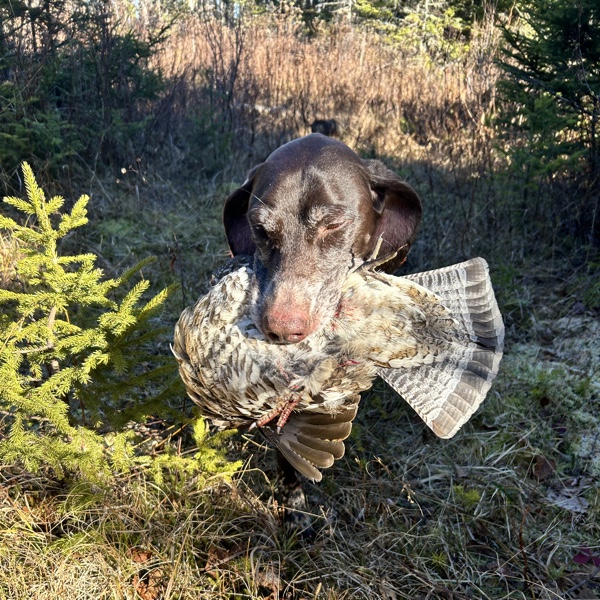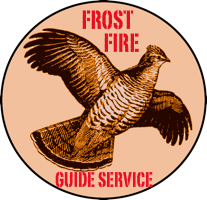
Season In Review
There's a few things that stand out about the 2024 season, primarily the number of grouse we encountered compared to last year. It was a better year for sure, and the warm and dry weather in June had a lot to do with it. The population of grouse seemed to bounce back from its low point last year, and the size of the broods we were encountering in training runs in the summer and September confirmed it. That bore fruit on most of our days in the grouse woods, though they certainly had their moments of being elusive as well.
The weather, while the temps remained very unpredictable this October, was mostly pleasant for us. Lots of sun for the most part and I think we only had to cancel one trip because of rain. The temperature fluctuated from week to week it seemed, and we would literally go from 70 degree highs to 40 degree highs in the span of a week, and this swing in temperature happened several times. Of course, the warmth affected the stamina of the hunters and the bird finding ability of the dogs, but we had some great days when it was colder, as you can imagine.
Wind was also a factor on more than a few days this season. It often made the grouse more skittish than usual, and I'm sure there were a fair amount of flushes that we never heard on those days. Thankfully, we only had to deal with snow once or twice and there really wasn't much accumulation - fine with me, as far as I'm concerned.
The foliage? Our dry September seemed to indicate that we might have an early leaf drop in October, but that really didn't seem to happen this year. Like most years, the leaves fell predominantly when we had storms come through the area, and nearly everything was down by October 20 or so. Of course, the chances on grouse in particular got much better when we officially entered "stick season".
By The Numbers ...
Week By Week
Sept. 28 to Oct. 5: 78 grouse & 27 woodcock contacted. 4 grouse, 7 woodcock killed.
Oct. 6 to Oct. 12: 40 grouse & 43 woodcock. 3 grouse, 5 woodcock killed.
Oct. 13 to Oct. 19: 56 grouse & 48 woodcock. 2 grouse, 7 woodcock killed.
Oct. 20 to Oct. 26: 61 grouse & 37 woodcock. 7 grouse, 13 woodcock killed.
Oct. 27 to Nov. 2: 67 grouse & 22 woodcock. 5 grouse, 6 woodcock killed.
Nov. 3 to Nov. 9: 46 grouse & 12 woodcock. 1 grouse, 3 woodcock killed.
Vermont vs. NH?
New Hampshire: 120.5 hours hunted, 389 birds contacted, 3.23 birds/hr, 17 grouse, 29 woodcock taken
Vermont: 62.5 hours hunted, 160 birds contacted, 2.56 birds/hr, 6 grouse, 12 woodcock taken
The Dogs
Rocky: 46 hours hunted, 5 grouse, 5 woodcock taken, 2 grouse and 5 woodcock over points
Bella: 45 hours hunted, 3 grouse, 7 woodcock taken, 2 grouse and 7 woodcock over points
Millie: 42.5 hours hunted, 5 grouse, 9 woodcock taken, 3 grouse and 9 woodcock over points
Rosie: 15 hours hunted, 1 grouse, 7 woodcock taken, 7 woodcock over points
Bode: 3.5 hours hunted, 0 birds taken
As you would expect, the most birds contacted were in the first week of the season, when young birds are prevalent and are learning the ropes the hard way. However, the best shooting seemed to occur in the October 20 to 26 timeframe. Not only is the visibility better, but I have two sets of clients that week that can really put birds in the vest, and they tend to skew the numbers a bit. Still, the dogs provided shooting opportunities for the vast majority of my clients, regardless of when they came to hunt.
As far as the woodcock are concerned, all of October can offer good chances on timberdoodles. In addition to our natives, the imports start trickling in early on in the month and continue for the next few weeks. We generally see a lessening of the migration the last week of October, but there were still some stragglers around then for us. Naturally, factors such as barometric pressure, moon phase, weather to the north and in our area, and wind direction (and speed) dictate a sizable amount of behavior of our woodcock. "Here today, gone tomorrow" is an unfortunate aspect when hunting the migration.
The numbers suggest that New Hampshire has treated my clients better than Vermont, but they are a bit misleading. Most of my grouse coverts are in New Hampshire, so this is where we spend most of our time. Additionally, many of my proven woodcock coverts, some of which are utilized by flights during the heaviest period of migration, are in New Hampshire, which can throw the numbers off quite a bit if we hit it right. Still, northern Vermont remains a hidden gem of New England grouse hunting, and there were many days this year where I commented to my clients, "Have we even heard another shot today?"
Finally, the performance of the dogs, and development of the younger dogs in particular, deserves some attention. With Bode easing in to retirement, and Rosie banged up from nail and puncture injuries for most of October and early November, the vast majority of the responsibility to lead us through the grouse woods competently fell to Millie (8 yrs old), Bella, and Rocky (both 1.7 yrs old). They performed very well in my opinion, and seemed to get better and better as the season wore on. They all hunted the same approximate amount of hours and each had golden moments out there, but you already know this if you've been following the blog.
While each dog started out the season a little ragged, they each found their desired searching range without too much electricity, and were consistently pointing grouse and woodcock the last few weeks of our guiding season. Each did a great job recovering dead birds and cripples, further illustrating their development. More training next year will hopefully smooth out the rough edges on each dog.
The dogs accounted for 42 of the 64 birds we have taken this year - what about the other 22 birds? Simply put, they fail in to the "Other" category: birds taken with the aid of a client's dog, or a wild flushing bird that was shot by a client that was hunting in the ready position. As far as dogs that hunted with us, a special mention for Scott's setter Dixie, who I watched nail grouse after grouse for two days this October. She was incredible, and Scott and Chris rewarded her a number of times for her efforts.
And now, the moment you've all been waiting for ...
Best day contacting birds: October 16 (17 grouse, 23 woodcock)
Worst day: October 8 (6 grouse, 2 woodcock)
The 2024 Golden Shotshell Award goes to Scott M. (5 grouse, 2 woodcock - yes, he achieved a limit of grouse one day), with an honorable mention for Daniel L. (2 grouse, 4 woodcock).
Nice shooting guys, and remember, the amount of grouse you contact is directly proportional to the number of miles walked ...
